Lecture 11 lexical cohesion 英语词汇学 教学课件
- 格式:ppt
- 大小:487.00 KB
- 文档页数:51

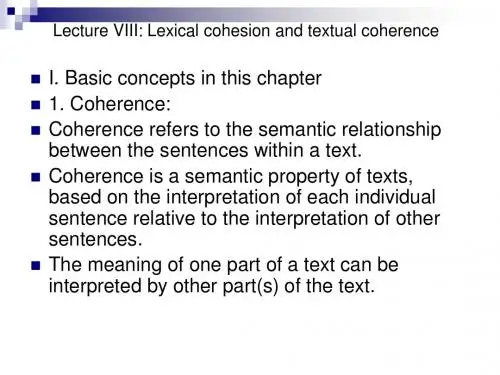
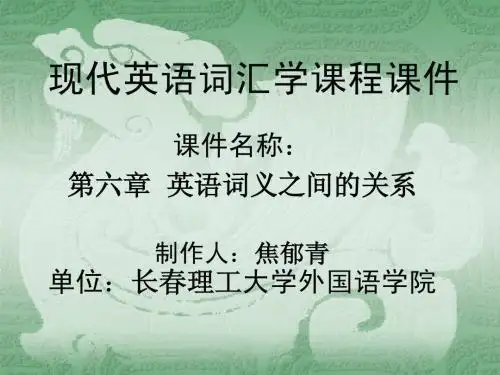
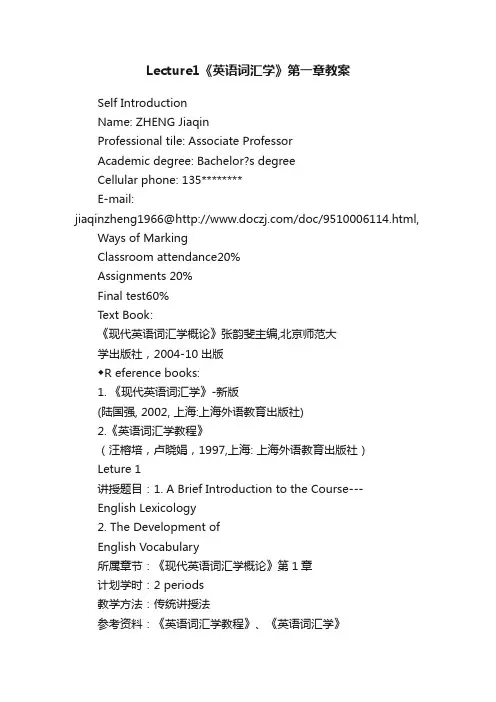
Lecture1《英语词汇学》第一章教案Self IntroductionName: ZHENG JiaqinProfessional tile: Associate ProfessorAcademic degree: Bachelor?s degreeCellular phone: 135********E-mail:jiaqinzheng1966@/doc/9510006114.html, Ways of MarkingClassroom attendance20%Assignments 20%Final test60%Text Book:《现代英语词汇学概论》张韵斐主编,北京师范大学出版社,2004-10出版◆R eference books:1. 《现代英语词汇学》-新版(陆国强, 2002, 上海:上海外语教育出版社)2.《英语词汇学教程》(汪榕培,卢晓娟,1997,上海: 上海外语教育出版社)Leture 1讲授题目:1. A Brief Introduction to the Course---English Lexicology2. The Development ofEnglish Vocabulary所属章节:《现代英语词汇学概论》第1章计划学时:2 periods教学方法:传统讲授法参考资料:《英语词汇学教程》、《英语词汇学》教学目的和要求:通过本单元的学习,学生对英语词汇学的研究对象、性质、特点以及英语语言的发展进程等基本知识有了一定的了解。
IntroductionWhat is linguistics?Generally speaking, linguistics can be defined as the scientificstudy of language. To be more exact, linguistics studies the general principles upon which all human languages areconstructed and operate as systems of human communication.LEXICOLOGY1.The term lexicology contains two Greek morphemes: “lexikon”and “logie”; the former means “word or phrase”, while the latter “learning or the study of”.2. The literal meaning is the “science of the word”.3. It is the study of the signification/meaning and application/uses of words.4. Lexicology is a branch of linguistics inquiring into the origins and meanings of words ( WNWD-Webster?s New World Dictionary of the American Language ).THE FIVE SUB-BRANCHES OF LEXICOLOGY 1.Semantics: the study of the meanings of words and other parts of language.2.Etymology: studies the meanings, origin and history of individual words and their development.3. Historical lexicology: studies from a historical point of viewthe development of vocabulary4. Phraseology(成语学): mainly deals with set expressionsand idioms.5. Lexicography: studies the writing and making ofdictionaries.English lexicologyEnglish lexicology deals with English words, their origin, meaning, morphological structures, semantic structures, sense relations , idioms, historical development, formation and usages.The Nature of English LexicologyEnglish lexicology is a theoretically-oriented course. It is chiefly concerned with the basic theories of words in general and of English words in particular. However, it is a practical course as well, for in the discussion, we shall inevitably deal with copious stocks of words and idioms, and many usages examples. Naturally, there will be a large quantity of practice involved.THE AIMS OF THIS COURSEOffer an insight into the origin and development of the Englishvocabulary.Give a systematic description of the English vocabulary.Discuss the problems of word-structure and word-formation Study the use of English words , their meanings and changes in meaning, their sense relations.THE SIGNIFICANCE OF THE COURSEDevelop your personal vocabulary and consciously increase your wordpower (active vocabulary).Understand word-meaning and organize, classify and store words moreeffectively.Raise your awareness of meaning and usages, use words more accurately and appropriately.Develop your skills and habits of analyzing and generalizinglinguisticphenomena in your learning experiences.Ultimately improve your receptive and productive skills in languageprocessing as well as language production.TWO APPROACHES TO THE STUDY OF ENGLISHLEXICOLOGYA synchronic approach is an approach to the study of a language at one period of time,A diachronic approach is an approach to the study of the change in a language that took place over a period of time.There are two approaches to the study of words, namely synchronic and diachronic. From a synchronic point of view, words can be studied at a point in time, disregarding whatever changes might be taking place. For example the word …wife? now means ……a married woman, esp. in relation to her husband??. This is the current meaning.It has an obsolete meaning …woman?, which is only preserved in midwife, housewife, Bathwife, etc. However if we take a diachronic perspective, we will consider the word historically, looking into its origin and changes in form and meaning. In this light, the word …wife? evolved from the old English … wif ?, meaning … woman?, but later it became specialized in the course of development to the modern meaning …a married woman?.TWO APPROACHES TO THE STUDY OF ENGLISHLEXICOLOGYModern linguistics is mainly synchronic, focusing on the present-day language (English words), but we need the diachronic approach as a supplement, for a knowledge ofhistorical development of the vocabulary will definitely be of great help to us in our language study.Questions and Tasks1. What is lexicology?2. What is the nature and scope of English lexicology?3. Why should a student of English study English lexicology?。
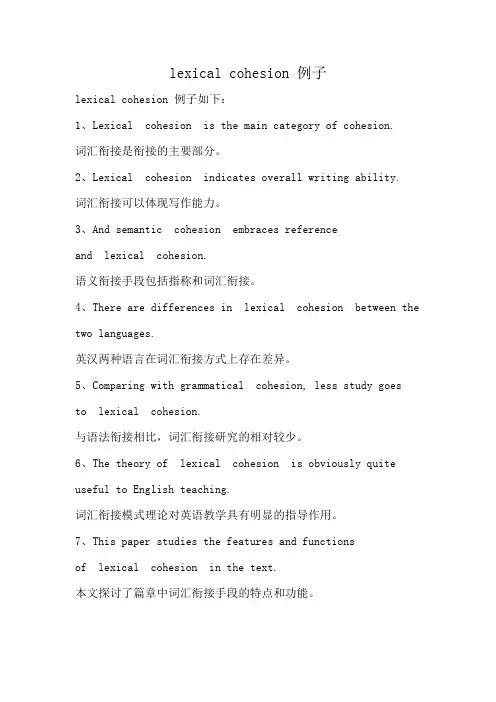
lexical cohesion 例子lexical cohesion 例子如下:1、Lexical cohesion is the main category of cohesion.词汇衔接是衔接的主要部分。
2、Lexical cohesion indicates overall writing ability.词汇衔接可以体现写作能力。
3、And semantic cohesion embraces referenceand lexical cohesion.语义衔接手段包括指称和词汇衔接。
4、There are differences in lexical cohesion between the two languages.英汉两种语言在词汇衔接方式上存在差异。
5、Comparing with grammatical cohesion, less study goesto lexical cohesion.与语法衔接相比,词汇衔接研究的相对较少。
6、The theory of lexical cohesion is obviously quite useful to English teaching.词汇衔接模式理论对英语教学具有明显的指导作用。
7、This paper studies the features and functionsof lexical cohesion in the text.本文探讨了篇章中词汇衔接手段的特点和功能。
8、Lexical cohesion is an important cohesive device to cohere a business English text.词汇衔接是实现语篇连贯的重要衔接机制之一。
9、Lexical cohesion plays an important part in the realization of discourse coherence.词汇衔接是实现语篇连贯的重要手段。
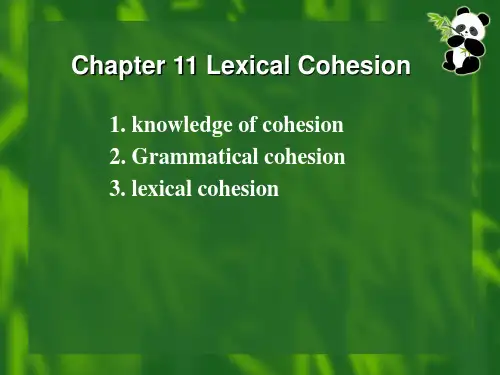
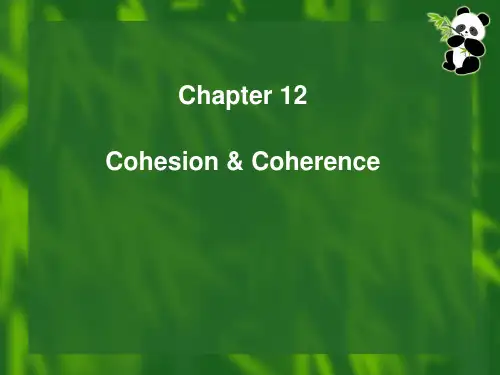
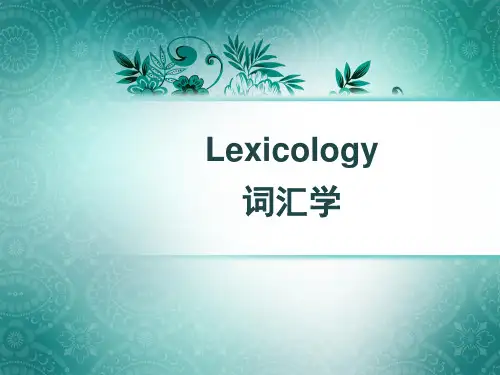
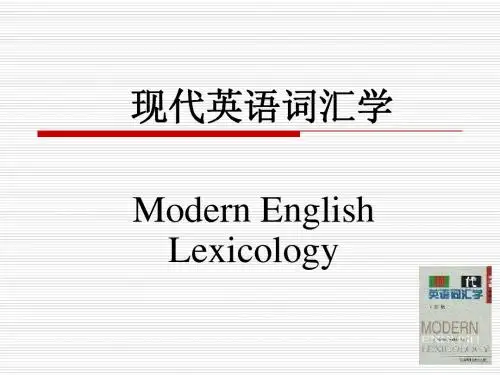
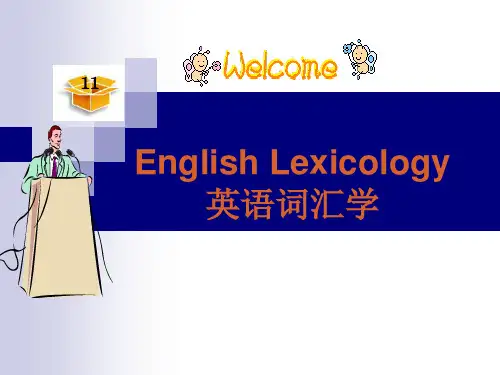
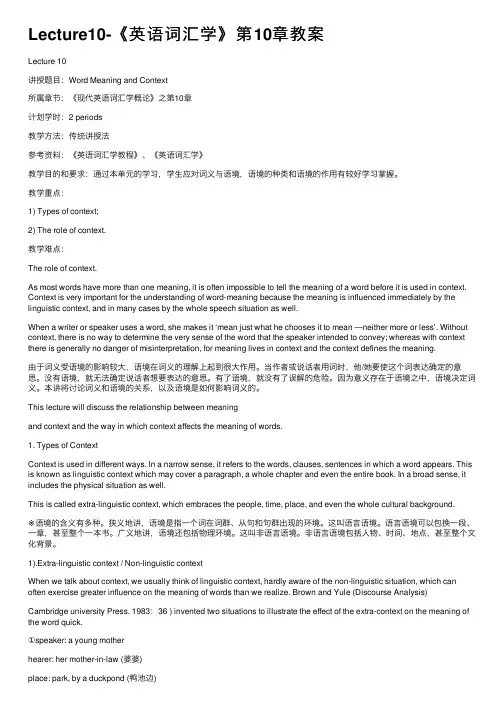
Lecture10-《英语词汇学》第10章教案Lecture 10讲授题⽬:Word Meaning and Context所属章节:《现代英语词汇学概论》之第10章计划学时:2 periods教学⽅法:传统讲授法参考资料:《英语词汇学教程》、《英语词汇学》教学⽬的和要求:通过本单元的学习,学⽣应对词义与语境,语境的种类和语境的作⽤有较好学习掌握。
教学重点:1) Types of context;2) The role of context.教学难点:The role of context.As most words have more than one meaning, it is often impossible to tell the meaning of a word before it is used in context. Context is very important for the understanding of word-meaning because the meaning is influenced immediately by the linguistic context, and in many cases by the whole speech situation as well.When a writer or speaker uses a word, she makes it ‘mean just what he chooses it to mean —neither more or less’. Without context, there is no way to determine the very sense of the word that the speaker intended to convey; whereas with context there is generally no danger of misinterpretation, for meaning lives in context and the context defines the meaning.由于词义受语境的影响较⼤,语境在词义的理解上起到很⼤作⽤。
Lecture 7讲授题目:Word Meaning所属章节:《现代英语词汇学概论》之第5章计划学时:2 periods教学方法:传统讲授法参考资料:《英语词汇学教程》、《英语词汇学》教学目的和要求:通过本单元的学习,让学生对词的意义、词义的理据和词义的类别等知识有基本的了解和认识。
教学重点:①Some basic notions: meaning , reference, concept and motivation;②Semantic triangle;③Four types of motivations④Classification of word meaning教学难点:①Four types of motivations②Classification of word meaningWord meaningThe relationship between language and the world conceptworld languageWord meaningThought or reference (concept)ReferentSymbol(object in the world) (word, sentence ) Ogden & Richards‟ the semiotic triangleThe semantic triangleAccording to Ogden and Richards, the symbol is the linguistic element, that is the word ,sentence ,etc., and the referent is the object,etc. , in the world of existence, while thought or reference is concept. This is called the semantic triangle.奥德根和理查德提出的“语义三角”的基本观点是:概念、思想和符号(即字词)发生直接联系,而与“所指客体/事物”(即现实世界和人的经历)并不存在直接联系。